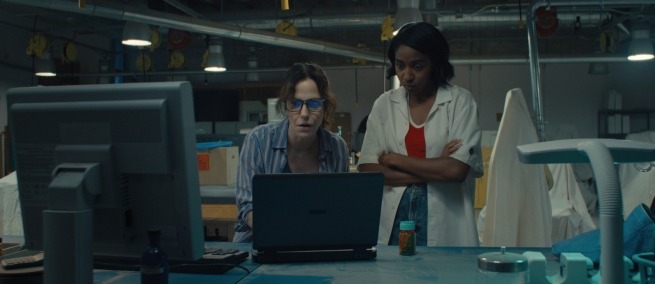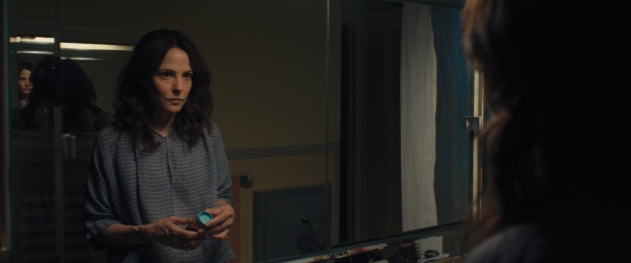
Writer and director Bernardo Britto’s new film OMNI LOOP stars Mary-Louise Parker as a quantum physicist with a strange medical condition—a black hole growing inside her chest. Diagnosed with a week left to live, she finds herself stuck in a time loop and, with the help of a student (Ayo Edibiri), tries to use the time to stop the inevitable. The film is being released by Magnolia Pictures and is now available on VOD. We spoke with Britto from his home in New York City about his relationship to science, the time loop trope in movies, and what his interest in it was for OMNI LOOP.
Science & Film: Despite its sci-fi premise, so much of your film feels grounded in science, both in terms of the dialogue and the production design. I was scanning the credits looking for science consultants—did you work with any?
Bernardo Britto: Oh, my goodness, I'm realizing I forgot to put in some scientists who we talked to...
S&F: This will be your chance! I'm also wondering, more broadly, what your relationship is to science?
BB: So many people in my family were teachers and college professors, not necessarily in science, but in philosophy and history and things like that. So that world of academia always felt somewhat accessible. My grandma has a book coming out soon in Brazil, September 27, and that's another sort of academic philosophy book. My great uncle is a biochemist, and every time I talk to him, either it's about movies or it's about DNA, genome sequencing, a lot about CRISPR and all those kinds of things. What I always thought was interesting talking either to my grandma, who's a philosopher, or my great uncle, who's a scientist, is that the desire is the same, the question is the same; it's all trying to understand life and trying to understand where it comes from. And that's not too different from what I do as a filmmaker. So for me, it just felt right for this type of story, where it is so introspective and so existential, and trying to understand it all.
In making the movie, I spoke to a scientist named Begüm Aydin. At the time she was studying epigenetics. It was fascinating talking to her. And again, it was a similar desire to try to understand where the soul resides, where life originates. What I was most interested in was the emotional truth of what being a scientist is like. It was less the technical specifications of it all, than how can I capture the essence of what that looks like every day, going in and trying out new, different experiments? From those conversations, it was the repetition, the failure of it all, which obviously is in the movie a lot, and then also some of the ladders of success of it all, and the kind of metrics of success that you have. It's one of those jobs where it is your job, but it's also your passion, which is, I think, very similar to filmmaking, and it can feel all-encompassing in that way.
Beyond that, specifically as it relates to quantum physics, my producer, Ben Cohen—who I developed the script with, and who I've made all my movies with—his father-in-law is a genius physicist at Princeton. So, we actually got to go to the Princeton physics labs and tour his labs there and see all the crazy things that he's doing with quantum computing and all this stuff that I'm probably not allowed to talk about, because it's like, top secret.

Mary-Louise Parker in OMNI LOOP. Photo courtesy of Magnolia Pictures.
S&F: Can you speak a bit about the production design?
BB: We had an incredible production designer, Katie Birmingham. We took a college woodshop and turned it into this bizarre lab. It just felt big and empty and dusty and full of buttons to press and technology and all this kind of stuff. And honestly, the labs that I've toured aren't as dusty, they're much newer, but there's also a lot of old equipment that still works. And it's always like so much more clutter than you think [laughs]. Obviously, a movie doesn't have to be real, but hopefully it still feels somewhat grounded.
I think someone at some point summed up my filmmaking so efficiently that no one even needs to say anything else about it. They said that what I do is I take fantastical things and I present them in a boring way, and then I take minutia and present it in a fantastical way. And I was just like, yeah, that probably does sum it all up. And so for me, you take the most incredible things possible and you show them just kind of like, it's a box in a drawer kind of thing. And then you take a moment between two people sitting on a couch, and it feels infinite in some way. That was always the goal: to make the everyday seem poetic, and then to make the amazing, incredible stuff feel pedestrian, which I think is oftentimes how we engage with technology and with science. Artificial intelligence just becomes something that you use to type up an email or something like that. Technology feels a little bit less special in the everyday. I think there's something slightly funny about that. So, I just like those little contrasts. They're funny to me, and I don't know why.
S&F: The time loop trope is kind of the ideal for a scientist, in the sense that they get to try the same thing again and again without losing time.
BB: There's a line in the movie where she says, with all the time in the world, what if I still can't do it? For myself, I'll be like, if I only had enough time on set, if I could get all the shots, or if I could just edit forever, I would make it brilliant. And there's something about removing that restriction that is so scary, because it's like, what if I can't? Then at that point, maybe it's just that I'm not smart enough to think of the solution. The repetition of it all spoke to me.
S&F: How did you think about your film in relation to other time loop films, the most obvious being GROUNDHOG DAY?
BB: GROUNDHOG DAY is still probably the best one. I get excited about the challenge and it's not exciting to do something where it's like, oh yeah, I can just do this type of movie again. There are two things specifically that I thought were different enough that made the story worth pursuing. One is that it's a choice every time. With GROUNDHOG DAY, he's trying as much as he can to break out of it [the cycle]. He doesn't like where he's at, and he's trying to go back to regular life. For her, it's a choice to stay in this loop every time, because she doesn't want to move forward. And so, I thought there was something interesting about that—the regressive nature of that character. She's not only trying to go back these five days, but she's trying to go back even further. It's not about moving on from the loop, it's about stay in the loop as long as possible. I thought that was a sort of interesting subversion of it.
The other thing is just starting in the loop already and making use of those tropes, of the audience’s familiarity with those tropes. But really it was just a jumping off point for the emotions and all the existential questions that arise from that [scenario], which I think GROUNDHOG DAY also does so well with those kind of philosophical, Buddhist adjacent... I love that movie. I haven't watched it in a really long time. I'd be really curious to rewatch it now and be like, what did I rip off and what didn't I?
S&F: They're both about appreciating the present moment, in a way.
BB: So much of it does come down to that. Going back a little bit to when we were talking about science and repetition… I was just talking to my partner about this, she's about to go make her movie. I was talking about enjoying the process of it all. The process can feel excruciating, but if you love this thing, then it's not. That's living, that reputation, so trying to enjoy that part of it. If you don't love being in the lab every day, then maybe don't be in the lab every day.
♦
TOPICS